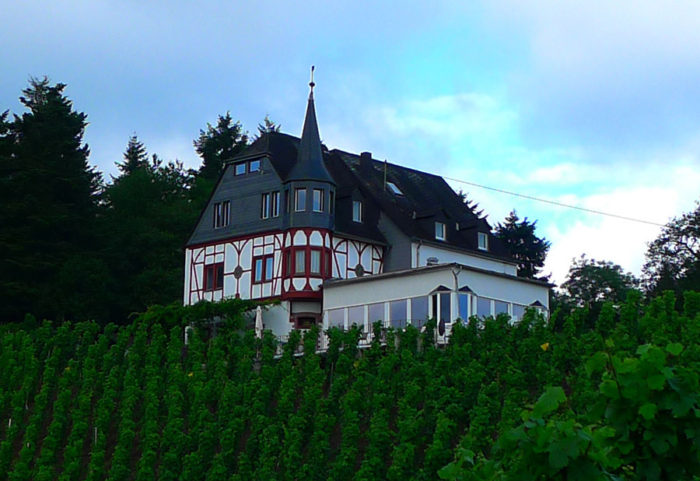
David Byrne has described his 1984 tune Naive Melody as a love song full of non sequiturs.
I’ve been thinking about writing something a bit more meaningful about Stein a long time, and listening to the Talking Heads last night, hearing this song, hearing that line… it spoke to me so clearly about who Ulli Stein is as a human (for the moment, forget the grower part), I figured I’d pen my own love song, for Ulli Stein.
Yes, this is some selling here. So let’s get that over with it so we can focus on more important things.
Stein’s 2016 Riesling “Ohne” is, I think, one of the greatest white wines he’s ever made. You should really consider buying some. (Though in truth there isn’t a wine we import from him that I wouldn’t strongly recommend. So, how’s that?)
As for the 2016 “Ohne,” well, we only have a few more cases left (Stein is sold out at the estate) and I wanted to reach out to all the people who have emailed us, or signed up for our emails. You should be able to find this bottle for under $40 retail. If you’re a wine lover and just want help finding a bottle or two, email us here and 1) tell us how many you want and 2) where you live. We’ll find someone who can sell you the wine. It’s that easy.
“Ohne” means “without” in German. Yes, this is a zero-sulfur wine, though this fact is hardly very important. Or, if it’s important, it’s important not in the ways you probably think it is. We are wily importers who believe, boldly, that sulfur is not necessarily poison. Fact is, you’ll probably have a hangover if you drink this entire zero-sulfur bottle on your own in one sitting; it might be the alcohol that causes hangovers?
Now, what is fascinating and beautiful and important about this bottle, especially in the context of zero-sulfur wine, is that the wine still speaks clearly about both Riesling and the Mosel. Zero-sulfur has in some ways become the new “new oak” – the ubiquitous characteristic that can lose as much of a wine’s sense of place as it hopes to reveal. Yet with Stein’s zero-sulfur “Ohne,” there is still the soaring citrus of Riesling, still the saturating core of mineral so common in Mosel wine. It is not the angular, razor-sharp acidity of a Mosel Kabinett; it is a mineral expression just as compact and dense, yet smoother, as if a sword had been polished down to a sphere.
The most cynical would ascribe the Mosel’s “minerality” to sulfur, as if anything as complicated as winemaking could be boiled down to one thing. (It also begs the question: if it’s all sulfur, why don’t sulfured wines from other regions have that Mosel minerality?) Yet, without sulfur, Stein’s Riesling speaks of slate soils; if you know the signature, you can recognize it. For the full tasting note on the Stein Riesling “Ohne,” please go here and feel free to peruse our wildly updated wine section on this website.
This wine though, is just one facet of the complex and inspired mosaic that is Ulli Stein and, to give credit where credit is due, the Stein family. It was Stein’s father after all, who turned away the subsidies the German government was giving growers to rip out old vines and plant the new clones, with their emphasis on early ripening, yields and disease resistance. Because of this, Stein now owns something around 10% of all the ungrafted vines in the Mosel. This estate is, in many ways, one of the most important genetic treasure troves of the Mosel. While the famous “1900” Riesling by Stein is sourced from the second-oldest producing Riesling vineyard in the Mosel, approximately 1,200 ungrafted vines planted in the year nineteen hundred, it’s worth noting that even Stein’s “basic” wine, the “Blauschiefer Trocken” (blue slate dry), is largely sourced from one vineyard with 70-80-year-old ungrafted vines.
Yet, wine is more than just fermented grape juice, and for the importer (at least for me) the wine is not necessarily more important than the person. It’s a unique relationship, grower and importer, the shared product woven as it is into the very fabric of what it is to be human. Which is to say, woven into the fabric of society, of being social, of gathering together, to talk, to work, to eat. I’ve never imported zippers or bowling balls or clicky pens, but my guess is that these relationships are a bit more cut and dry.
Who has zippers that are of a good quality and fairly priced? Done. Sure, you can go to a fancy dinner to celebrate the deal, but the relationship isn’t necessarily woven into the dinner itself, as it is with wine.
When I go to “buy” wine, visiting the growers, I sit with them, with their family – daughters and sons and aging parents – in their homes, at their tables. We are breaking bread; it’s a sacrament of sorts. At the most shallow level, you have to like these damn people because you’re going to be spending a lot of time at the table with them. Yet, there is something deeper and more vital; there seems to be to be a moral component here. It’s not easy to measure or quantify, but it’s there.
The moral people the growers are is important. It’s just too intimate a relationship to work with people you don’t really, really like, enjoy… respect. And in some cases, love.
And so we come to Dr. Ulrich Stein, Ulli. Winemakers in general are compelling humans; they are the brave poets, the spirited visionaries who forsake our easy material culture for work that is, at its core, incredibly beautiful, very difficult (though that part gets glossed over) and, with certain rare exceptions, not very profitable. Yet among this rather rarified group of humans, Stein stands apart for me.
Stein is one of the only winemakers I talk to who rarely talks that much about the wine. Or, put another way, he is just as passionate, maybe more passionate, about the experience of making the wine. He strongly resists using machines in the vineyard simply because he doesn’t want the noise, the fumes of the engines, the harsh artificial commotion. It makes the experience less beautiful. This idea is so simple it seems almost naive, or silly, or just besides the point. Yet this is exactly the point. What in the hell are we doing with our lives if we’re not trying, in the most basic ways, to make our days as beautiful as possible? Do you taste any of this in the wines? Absolutely not. And maybe.
In a world where migration is becoming a contentious issue, for so many complex reasons, Stein talks about the humanity behind the migration. Our agricultural world relies on enormous amounts of migration. Stein has had a Polish family working with him for more than a decade; they are respected and valued members of the team, of the family. They are paid a living wage well above the minimum.
I’m sure it speaks as much to my own cultural blind spots that I never even really thought about this part of the wine business. In the pursuit of terroir, hipster labels and hitting the right price-points, who stops to think about the lives of the people who really do the hard work? The idea is so basic I totally missed it for years… until Ulli talked to me about it, over a glass of wine.
 I’ve been visiting Stein for twelve years now, driving up to his solitary hotel on the mountaintop. My time with him has included a million such learning experiences, about wine and about life and, beautifully, about how these two things can come together and be one in the same. This summer (2019) – in little more than a week in fact – I’ll take my wife and children to see the Mosel, to see Ulli on the mountaintop. We will drink, together, some of the most mineral-driven and angelic wines of the Mosel. And that will be great, but that really won’t be the point.
I’ve been visiting Stein for twelve years now, driving up to his solitary hotel on the mountaintop. My time with him has included a million such learning experiences, about wine and about life and, beautifully, about how these two things can come together and be one in the same. This summer (2019) – in little more than a week in fact – I’ll take my wife and children to see the Mosel, to see Ulli on the mountaintop. We will drink, together, some of the most mineral-driven and angelic wines of the Mosel. And that will be great, but that really won’t be the point.
If any of this has made you more curious about what Ulli Stein is doing, about the wines, that’s great. This is, after all, how we both feed our families. His grower profile with a great video made by another great friend of mine is online here.
The Stein wines we currently have in stock are listed here; please do check them out and try one. They are little, angelic, revelations.
Stephen